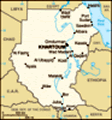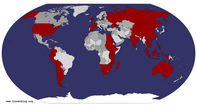Advertisement
Published: April 1st 2009
I convince myself that the fly infestation is Abri-specific, and head south again the next day, together with Tintin and Helen. Tintin buys me a Pepsi, a kind gesture and, as the almost-full bottle dangles from my fingers, I eventually have to explain to him that I only drink sparingly on a travel day as my bladder is fond of demanding to be emptied at the least convenient times. I pour the drink into my water container, thus creating a sugary hydrating mixture that tastes more of iced tea.
This time the
boksi leaves with only four passengers and soon hits paved road. The Germans are dropped at the delightfully-named Wawa, from where they will visit an old temple of Amenhotep III across the river. Wawa appears to be a ghost town, inhabited only by flies. The paved road peters out to dirt, but it is hard and the dust problem is minimal. The number of passengers peaks at six and this is an altogether more pleasant journey than yesterday's had been.
Several hours in, we pass though a small settlement where I am surprised to see English graffiti - "Chinese stop killing Nubians" and "Human rights for Darfur"
are just two of the slogans spray-painted onto the walls. While most Western governments have been shunning Sudan and its El-Bashir-led administration, China has been cosying up to the leader and assisting in numerous infrastructure projects throughout the country. El-Bashir is another product of the African conveyor belt of despotic premiers, with the Darfur slaughter and religious conflicts in the south taking place on his watch. So not a nice man, but his considerable hostility to the West, and his country's natural resources, make Sudan an obvious target for overtures from other nations that don't necessarily see the West as the inevitable leaders in any future world order.
We have a lunch break after four hours and I am invited to share the food of my fellow passengers but we have no common language. The odd one out, the guy who has paid extra to be in the front seat, turns out to be Egyptian, on the way to visit a friend near my destination, Kerma, and he does not like Sudan one bit. He bemoans the poor state of the roads, and tuts that the Sudanese in this area don't speak Arabic, a statement whose accuracy I suspect.
This is his first time here and, he says in disgust, probably his last.
My best guess at what happens next is that the driver is new and forgets to pay a courtesy call to the police as we leave this nameless village after lunch. Whatever the reason, a policeman comes running, shouting, after the
boksi and we drive back to meet him. The man is friendly but insists that we all must disembark and enter the police station. The Egyptian and I have our hand luggage emptied and inspected item by item. The policeman thinks my contact lens case is a mobile phone, and I am secretly pleased that he leaves my laptop alone. He sees my plastic bag of bread, then darts into a back room from where he produces a bowl of dip from which several recently-disturbed flies are rising. I eat some dip, hoping this might help the situation. He eyes my water pouch, the diluted Pepsi now possessing the colour of what he suspects is whiskey, and insists on having a sip. He learns that I am telling the truth. There will be no tourist flogging today. With that, we are allowed to leave.
"Khawaja" is the word for foreigner here, with a hint of newcomer and a suggestion of whitie too, and it's one of the few understandable sounds I can pick out among the general babble of Arabic and Nubian that is a mystery to my ears. I hear it whenever I'm walking around, lip-read it on incredulous children as they see the pale face speeding by in a
boksi.
Sadly my destination, Kerma, has a fly problem that makes Abri look like an insect-free zone. Even with my mask on, I'm constantly swatting at them. The occasional shearing swipe leaves patches of fly blood on my skin. I look like I've had a bad shave. Fortunately my
lokonda is several hundred metres from the river and my only annoyances there are lazily circling houseflies. Still, I wonder just what unexpected places dust and flies will emerge from when I finally have a decent shower.
Kerma is larger than Abri and I have interaction with a number of locals including one of the blacksmiths, who speaks decent English. He tells me that most tourists here come through in groups, and is wondering where the rest of my companions are.
We chat, the words exchanged through the blackened air of this flyblown village.
The
lokonda only has electricity for four hours per day, in the evening, and the naked bulb in the dorm pulses to the rhythm of the generator nearby. I read for a while until the power shuts down and the light fades to a glowing filament then black. I have one other dorm-mate, who arrives quietly and chooses the bed as far away from mine as possible. He covers himself head to toe in a sheet and is soon lightly snoring.
As the night goes on, it becomes increasingly windy and I have to bolt the dorm door in order to keep it closed. When I wake in the early morning, I can hear loud gusting, and a bleary-eyed peer outside reveals reduced visibility and a brownish tinge to the sky. The
haboob is blowing, a dust storm sweeping in from the desert. The minaret on the nearby mosque is now only faintly discernible. My intended sightseeing for the day would appear to be in jeopardy.
I spend the next few hours in the room, the
haboob making its continuing presence known in the

 Nile
Nile
From the back of the boksi from Abri to Kermaclattering of loose shutters. The broken windows and ill-fitting door in the dorm admit a portion of the sand raging outside and I find my glasses acquiring a steady build-up. The air tastes gritty and, every so often when I pick up the WLP, I can feel the rough layer of sand that has been deposited on its open pages.
I emerge mid-afternoon, the storm now just a breeze, and find a much-changed atmosphere. The flies have gone. I sit in the cafe where yesterday I'd been forced to wear my mask and continually slap myself, and am able to enjoy a Pepsi without any insectoid harassment.
The main reason for me coming here is to see a
deffufa, a 4,500 year old mud-brick temple from the ancient kingdom of Kush. I hire a taxi to take me there. It's $10 to enter the complex, which seems rather steep but I buy my ticket. The
deffufa is not in great condition, the passing millenia having shorn it of all its detail and it's now a large mound of mud-bricks that nesting birds have liberally doused with excrement. The surrounding area contains the outline of foundations of other buildings
from the settlement but many look suspiciously new. I climb to the top of the
deffufa and survey the landscape from what is the highest point around. I see palm forests, the river, and not much else. With my taxi having been contracted to a wait-time of one hour, I fill the remaining minutes with a visit to the site museum, which sets me back a further $2.50. The English descriptions are surprisingly good apart from one room where they'd clearly had to switch to a budget translator - one exhibit shows a tool used to "surcum cast" children. The kingdom of Kush had survived for a thousand years before being conquered by the 18th Dynasty Egyptian pharaohs, and many remains of that occupation have been found. Still, I think Egypt spoiled me for both monuments and museums, and the
deffufa is by no means essential viewing.
Whereas Egypt had some variety in clothing styles, so far in Sudan it has been much simpler. Women in particular all wear headscarves and long dresses, with no bare hair to be seen. There is certainly no Western garb for the female half of the population. I see plenty of colourful designs,

 My dorm room
My dorm room
Karma (sic) Hotelthough, and am reminded of India by that. Men have similar attire to in Egypt, but with a greater percentage in thobes. Skull caps and keffiyehs keep the atmosphere exotic. Football tops are common amongst younger men and, when all else fails, football is a reliable topic of conversation as all the men here seem to know the top English clubs as well as the names of African footballers playing throughout Europe. I know few Sudanese sportsmen bar a couple of basketball players, but I receive only blank looks when I mention them.
Two nights, and it's time to say goodbye to Kerma.
Dull but possibly useful info i. The
boksi I caught from Abri to Kerma was supposed to leave at 9AM. I've no idea how many departures there are per day. It cost SP30 and took 6 hours. We had one break after about 4 hours.
ii. Supposedly there is a bus from Wadi Halfa to Kerma on Tuesday (i.e. the day the ferry arrives) - I think it leaves at 3PM, in which case it could be a push to make it depending on when the ferry gets in.
iii. I think the only
lokonda in Kerma is the Karma (sic) Hotel, costing SP5 for a dorm bed.
iv. Unless you are an archaeologist, I would opine that the deffufa is not worth visiting. There is another site further east of this that might be more interesting (at least going by some pictures I saw on the web). I paid SP20 for a "private"
boksi to/from the first
deffufa (about 15 minutes of driving each way) with 1 hour of waiting time. On the way back, the driver picked up a couple of passengers but I wasn't going to begrudge him that.
Advertisement
Tot: 0.103s; Tpl: 0.012s; cc: 14; qc: 26; dbt: 0.045s; 1; m:domysql w:travelblog (10.17.0.13); sld: 1;
; mem: 1.2mb

























